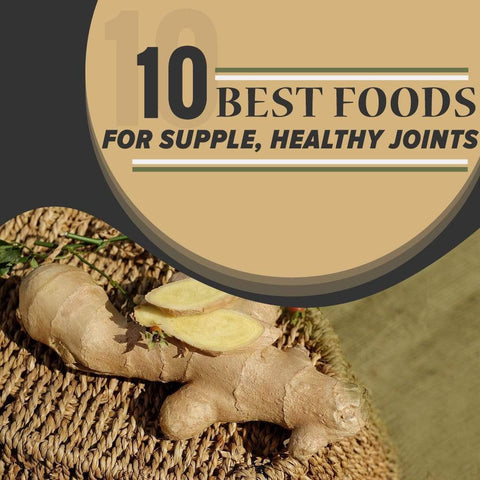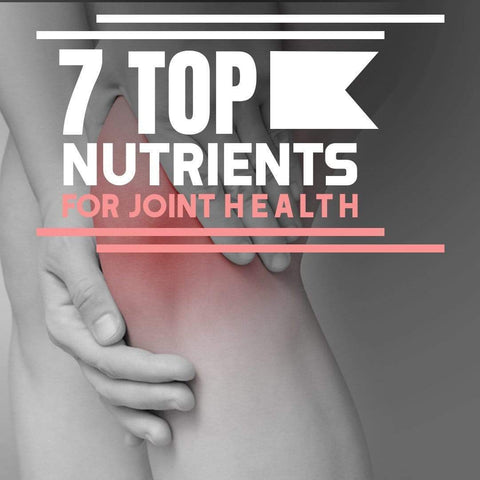
Believe it or not, your diet profoundly affects the health of your joints.
Some foods are really bad for your joints. And some foods are really good for them. For example, unhealthy foods contribute to poor joint health by promoting inflammation or the buildup of uric acid that damages joints.
There are many foods that can help protect joints by lowering levels of inflammation and uric acid in your body.
So what do you eat when you want to make your joints flexible, healthy, and pain-free
Eat For Your Joints
1. Ginger

A classic anti-inflammatory herb. And also a delicious spice to be used at any meal.
One large study on ginger’s effect on knee joint pain concluded that ginger relieved pain upon standing or walking 1†. Various studies show that ginger helps reduce pain - even causing “moderate-to-large reductions” in pain 2†. And the herb’s anti-inflammatory abilities are well documented in humans and animals 3†.
2. Pineapple
Pineapple contains a powerful anti-inflammatory enzyme - bromelain [4]†. In one study, “bromelain administration resulted in significant decrease in pain and stiffness in patients with” knee joint damage 4†.
The juice of pineapple has been shown to calm inflammation in the gut substantially 5†. Researchers even describe bromelain and a possible “alternative” to NSAID anti inflammatory drugs that people with joint problems pop like candy 6†.
Exclusive Bonus! Download the FREE report ‘3 Steps to Naturally Reduce Inflammation and Pain’ by clicking here.
3. Fish

The omega 3 fatty acids EPA and DHA that are found in fish are necessary to dampen inflammation in the body. These fats generate compounds called resolvins that put the breaks on inflammation after it starts.
Researchers think that the anti-inflammatory effects of fish can help prevent damage to joints 7†. There has even been improvements in the lubrication of joints - the ability of joints to cushion bones 7†.
And fish oil supplementation has been shown to reduce “reported joint pain intensity” in people with inflammatory damage to their joints 8†.
4. Bone Broth
Collagen provides cushion and range of movement for the cartilage in your joints. If that collagen fades, your joints will give you pain and you might even have bones scraping against each other because collagen isn't there to provide cushion.
Bone broth contains collagen and your body uses the amino acids from collagen you eat to generate more collagen for your own tissues†. A published review of collagen’s effects on joints showed that ingestion is evidenced to decrease joint pain and improve function 9†.
5. Papaya

Numerous laboratory and animal studies have shown papaya extracts have anti-inflammatory effects 10†. The phytochemical antioxidants in papayas, as well as the anti-inflammatory enzyme papain are responsible for these effects 10,11†.
6. Turmeric
Eat some curry or add this vibrant orange spice to any food of your choice - because it’ll soothe those joints!
Turmeric can decrease pain in people with inflamed joints 12†. There was “no significant mean difference” between turmeric/curcumin and pain medicine in an analysis of five studies 12†. In other words, turmeric is quite effective at providing joint pain relief†.
No doubt turmeric's pain-relieving effects are tied to its thoroughly proven anti-inflammatory effects.
7. Cherries
Cherries pack an antioxidant punch that helps fight inflammation but also can fight the build up of uric acid, which damages joints 13†. This acid actually crystalizes in joint tissue and causes its destruction.
This antioxidant-rich fruit has also been shown to reduce the chance of women having gout attacks by 35% 14†. That is a clear sign that cherries have the ability to prevent uric acid buildup in the joints and we also know that cherry consumption lowers uric acid in the blood 13†.
8. Oranges
Fresh fruits are critical to a healthy diet. They help your joints too, by virtue of their anti-inflammatory and antioxidant content.
Vitamin C is one of those antioxidants and vitamin C is important for keeping uric acid levels low. And oranges are an easy way to get hefty dose of this vitamin.
Eating more foods that contain vitamin C is associated with reduced uric acid buildup in joints 15†. And supplementation with vitamin C has been shown to significantly reduce blood uric acid levels 16†.
9. Beans
Pick your favorite bean or beans and make them a consistent part of your diet.
Toxic substances called AGEs (advanced glycation end products) can damage your joints 17†. AGEs form as a result of having high blood sugar or by eating foods that contain lots of AGEs.
Beans can help limit the amount of these toxins your body by keeping your blood sugar within a healthy range and by reducing your need for protein-rich cooked meat (which have high amounts of AGEs in them) 18†.
10. Green Tea
Drink to the health of your joints! A cup of tea has many health benefits and drinking one can also dampen the inflammation that hurts your joints.
A cup or more a day of green tea is associated with over a 12% reduction in C reactive protein, a marker of inflammation in the body 19†. Black tea is also anti-inflammatory but laboratory tests show that green tea is stronger due to its higher antioxidant content 20†.
Do you find yourself in a constant state of pain?
Does inflammation get in the way of performing everyday tasks because of the pain it causes?
Luckily, you can control inflammation by incorporating these breakthrough strategies! Once you’ve added them into your daily routine, you no longer have to worry about pain getting in the way of living your life to the fullest.
Click here to download the FREE report developed by our leading nutritionist, Evan Burns where you can learn which ingredients to incorporate into your diet so you can control inflammation and pain once and for all!
Download the report ‘3 Steps To Naturally Reduce Pain & Inflammation’ now!





